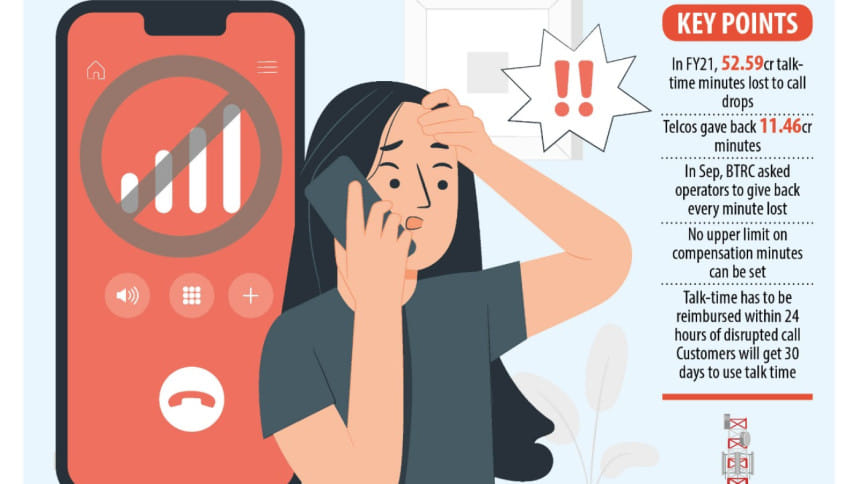Mobile users count losses as call drops pile up

Mobile phone users in Bangladesh incurred a loss of nearly Tk 18.50 crore in the fiscal year of 2020-21 because of the telecom operators' reluctance to compensate them for the disruptions they faced during calls.
A dropped call happens when a phone gets disconnected somehow from the cellular network, largely because of poor signal.
In the 12 months to June this year, people experienced disruptions, or call drops, of 52.59 crore talk-time minutes, according to a recent report of a committee formed by the Bangladesh Telecommunication Regulatory Commission (BTRC) to assess the quality of telecom services and the call drop issue.
But the telecom companies breached the commission's 2016 directive on returning a minute of free talk time for every minute of call drop.
The operators gave back one minute for every three to seven minutes of call drops, according to the report.
In FY21, the telecom companies reimbursed 11.46 crore minutes, which were only 22 per cent of the time for which the customers had paid in full.
This means because of the uncompensated 40.93 crore minutes of call drops, the customers lost around Tk 18.42 crore if the lowest per minute call charge of Tk 0.45 is taken into consideration.
The customers faced 37.6 crore minutes of call drops on the same network, also known as on-net calls, and 14.99 crore minutes on other networks, known as off-net calls.
According to the report, the operators reimbursed customers for only the call drops for their on-net calls.
Market leader Grameenphone provided the BTRC with data on off-net call drops for only two months—July and August—of the last fiscal year, citing technical glitches.
State-run Teletalk could not provide any data citing the lack of technical capability.
The BTRC committee blamed the mobile operators' failure to connect their towers with fibre optic cables as the main reason for the mounting call drops.
Local telecom operators use radio frequency to transfer or make calls whereas fibre optic cables are a far better medium for the purpose, experts said.
Grameenphone has so far been able to connect only 12 per cent of its base transceiver stations (BTSs) with fibre optic cable. It stands at 18 per cent for Robi and 13 per cent for Banglalink.
Teletalk informed the committee that its 60 per cent towers had fibre optic connections.
In a meeting on September 22, the commission decided that the subscribers should be compensated the minutes they are entitled to, and no upper limit on the compensation minutes could be set.
The talk-time has to be returned to the subscribers within 24 hours of the disrupted call, and they have to be notified through an SMS. The customers will get 30 days to use the talk time, according to the meeting.
The regulator also ordered Teletalk to attain the technological capability to collect data on call drops within three months and compensate the users for the disruption accordingly.
"Despite our sincere and relentless efforts, call drops are a regular feature in the telecommunication sector due to the very nature of the wireless technology," said Robi's Chief Corporate and Regulatory Affairs Officer Shahed Alam recently.
"However, we do strictly follow the regulation on compensating our customers in relation to the call drops."
According to the BTRC Quality of Service parameter, 2 per cent call drops are acceptable in wireless network, which is also in line with the standards of the International Telecommunication Union, the United Nations body responsible for matters related to information and communication technologies.
Robi's call drops accounted for 0.7 per cent to 0.8 per cent of the total calls in the past one year, according to Alam.
Ankit Sureka, head of corporate communications and sustainability at Banglalink, said, "Being a customer-obsessed company, we had introduced call drop compensation for our customers even before the regulator asked us to do so."
"We have continued the compensation system and have been reporting to the regulator since the directives were issued."
Grameenphone declined to comment on the issue.
Call drop can occur in an elevator, a tall building, while travelling or crossing a network pocket, or if the weather is bad, said SM Farhad, secretary-general of the Association of Mobile Telecom Operators of Bangladesh.
He says the mobile operators will use the recently purchased spectrum in their whole network within the next few months.
"Discussions are going on among the mobile network operators, the BTRC and the nationwide telecommunication transmission networks (NTTNs). We hope to see a positive result soon."
Abu Saeed Khan, a senior policy fellow at Colombo-based regulatory and policy research organisation LIRNEasia, says mobile quality of service obligations can't be enforced unless the BTRC fixes highly chaotic supply-side regulations.
The commission abruptly prohibited the mobile operators' rollout of optical fibre in 2011. Since then, the insolvent NTTNs could not satisfactorily deliver the optical fibre transmission networks either, according to Khan.
Most disturbingly, the commission allows the hoarding of spectrum although allocated frequency per million mobile subscribers in Bangladesh is the lowest in the Asia and Pacific region, he said.
"Therefore, the continuously deteriorating quality of service is the inevitable outcome of the BTRC's destructive regulations."

 For all latest news, follow The Daily Star's Google News channel.
For all latest news, follow The Daily Star's Google News channel. 



Comments